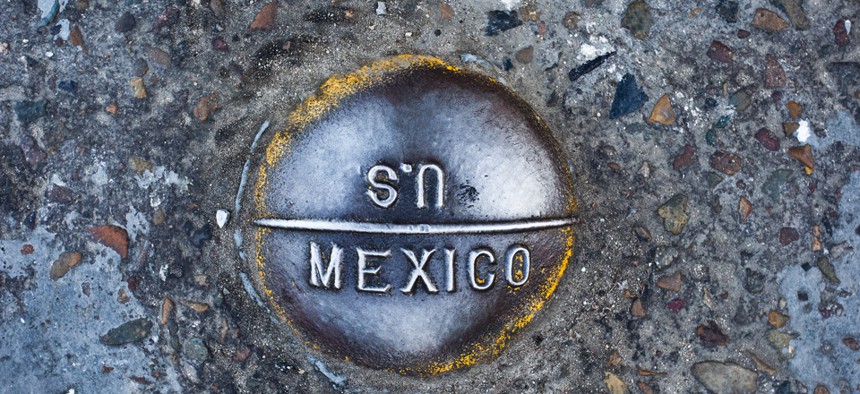
A marker notes the international border at San Ysidro. United States Customs and Border Protection
The Problem With Asking Congress for Money for the Border
Congress has a few requests of its own.
Asking for money from Congress is dangerous. President Obama requested $3.7 billion on Tuesday to address the surge of unaccompanied minors on the Rio Grande border. Now Republicans have leverage, and they have a few requests of their own.
Sen. Marco Rubio of Florida wants to require employers to verify electronically that new hires are in the country legally and the government to put in place an electronic entry-exit system at points of entry at the border. He says the border crisis creates an opportunity for policy-makers to finally address broader immigration enforcement.
House Speaker John Boehner wants the National Guard to be deployed to provide humanitarian assistance to the children waiting for processing.
Sen. John McCain of Arizona wants "an expedited return of the children back to their country of origin," which is not in the request Obama sent to Congress. "That's the only way to stop this," he told reporters.
By seeking a hefty amount of money to address a growing problem at the border, Obama has opened himself up to a hefty dose of GOP criticism for the ways in which his administration has handled the border up to now. He might not get anything out of it in the end, and the negotiations could drag on for weeks.
Congress will only be in session until the end of July, and there is little chance of his request being approved before then. During August, members will be traveling to their districts in campaign mode. By the time they return in September, the fiscal year will be almost over, and the midterm elections will be looming. The end of September will also prompt a familiar fight about what to do about expiring government funding to avoid a government shutdown.
A prolonged conversation about a border crisis—particularly one where the causes are a matter of debate and political mud-throwing—isn't the ideal way to approach the election. Nor is it helpful in resolving the regular negotiations over extending government spending until lawmakers agree on next year's levels.
Lawmakers said Tuesday that the request for emergency funds will be subjected to a regular appropriations process in both the House and the Senate. That takes time even when the relationship between the White House and Congress is functioning. Adding to the complications, the discussions must start in the House, where Republicans are dubious (to say the least) of the president's motives.
"They're so screwed up over there. I don't think they know what they're thinking," said Rep. Buck McKeon of California, the chairman of the House Armed Services Committee. He and other Republicans are upset that the White House telegraphed for almost a week through the press that the request would be $2 billion. Now it's almost double that figure, and it includes money for wildfires that no one was expecting.
Still, they acknowledge that it is not in theory a bad idea to pass funding to help process the children on the border. Does it need to be well over $3 billion? "He invented [the number]," Rep. Darrell Issa, R-Calif., said of Obama. "But we do need the money so we can incarcerate people so it's not 'catch and release.' Yes."
Issa's complaint is the most common of Republicans in both the House and the Senate, who say they don't want to approve more money that will simply allow the Border Patrol to release children into the custody of family or guardians inside the United States (some of them undocumented themselves), who will then melt into the landscape.
"Nothing will stop the flow like seeing a plane come back with kids. People that realize they just spent five to seven thousand dollars to send people to the border, and now they're back," said Sen. Jeff Flake, R-Ariz.
House Appropriations Committee Chairman Harold Rogers, R-Ky., is calling for a "close and thorough look" at the White House's funding request.
The money, if netted, will go toward taking an "aggressive approach on both sides of the border," according to a White House official.
The extra money would speed up the removal process of children who don't have a legitimate asylum claim, prosecute the criminal networks that are smuggling children across the border, and provide some $300 million in aid to Central American countries to identify and assist the children who are at the most risk of gang or drug violence. It is a multipronged approach that would send funding to the various departments, such as Homeland Security, Justice, Health and Human Services, and State, as well as to other international programs.
There is no set date for a House committee hearing, but the request will have its first hearing on Thursday in the Appropriations Committee in the Democratic-controlled Senate.
Issa said the House would take its time deliberating the request because it wants more than just "babysitting" for the unaccompanied minors on the border.
Rep. Pete Sessions of Texas best summed up Republicans' views on Obama's request. "To simply throw money at a problem and a problem continues, that's a bad answer," he said.
NEXT STORY: Doing Nothing Is—to Some—Doing Something






